Previewing Maxiotek's MK8115 SSD Controller: Can DRAM-less Drives Make The Cut?
by Billy Tallis on May 9, 2017 8:00 AM ESTATTO
ATTO's Disk Benchmark is a quick and easy freeware tool to measure drive performance across various transfer sizes.
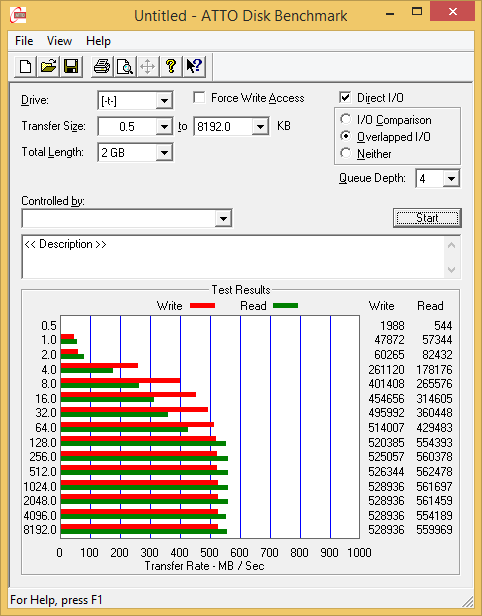 |
|||||||||
Both MK8115 drives have horrible performance on 512-byte transfers, far lower than anything else we've tested in recent memory. Reads are more than 100 times slower for 512B than 1kB transfers, and for writes the difference is a factor of 24. Most filesystems use 4kB or larger block sizes, but 512B accesses are still common enough that this is a fairly severe bug that needs to be dealt with in future firmware.
Beyond 512B transfers, the TLC drive's write speed scales up quicker than the MLC drive, but its read speeds struggle a bit. For 128kB and larger transfers, both drives are operating at full speed and performing similarly to each other and most SATA drives.
AS-SSD
AS-SSD is another quick and free benchmark tool. It uses incompressible data for all of its tests, making it an easy way to keep an eye on which drives are relying on transparent data compression. The short duration of the test makes it a decent indicator of peak drive performance.
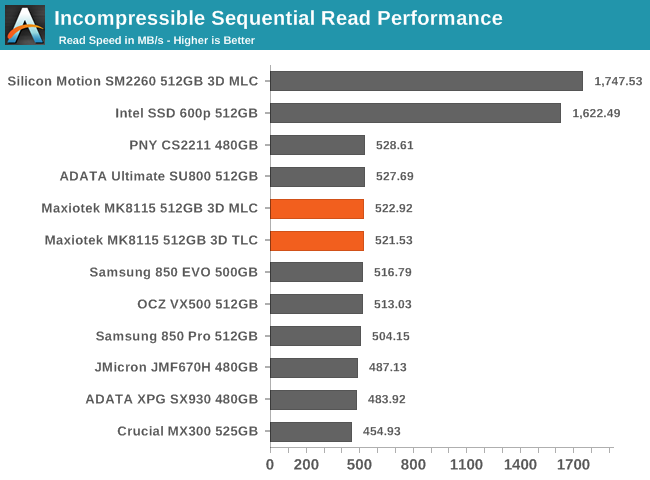
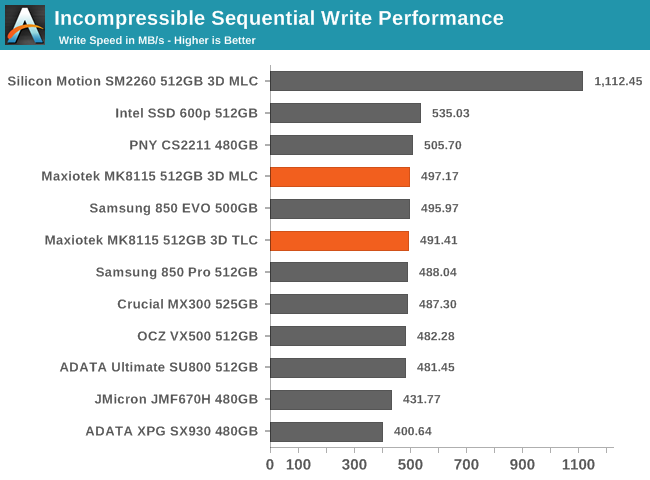
The MK8115 controller does make use of some compression, but its peak sequential read and writes speeds are not reliant upon the data being compressible. The MK8115 drives give AS-SSD performance that is typical for drives that are large enough to saturate the SATA link.
Idle Power Consumption
Since the ATSB tests based on real-world usage cut idle times short to 25ms, their power consumption scores paint an inaccurate picture of the relative suitability of drives for mobile use. During real-world client use, a solid state drive will spend far more time idle than actively processing commands. Our testbed doesn't support the deepest DevSlp power saving mode that SATA drives can implement, but we can measure the power usage in the intermediate slumber state where both the host and device ends of the SATA link enter a low-power state and the drive is free to engage its internal power savings measures.
We also report the drive's idle power consumption while the SATA link is active and not in any power saving state. Drives are required to be able to wake from the slumber state in under 10 milliseconds, but that still leaves plenty of room for them to add latency to a burst of I/O. Because of this, many desktops default to either not using SATA Aggressive Link Power Management (ALPM) at all or to only enable it partially without making use of the device-initiated power management (DIPM) capability. Additionally, SATA Hot-Swap is incompatible with the use of DIPM, so our SSD testbed usually has DIPM turned off during performance testing.
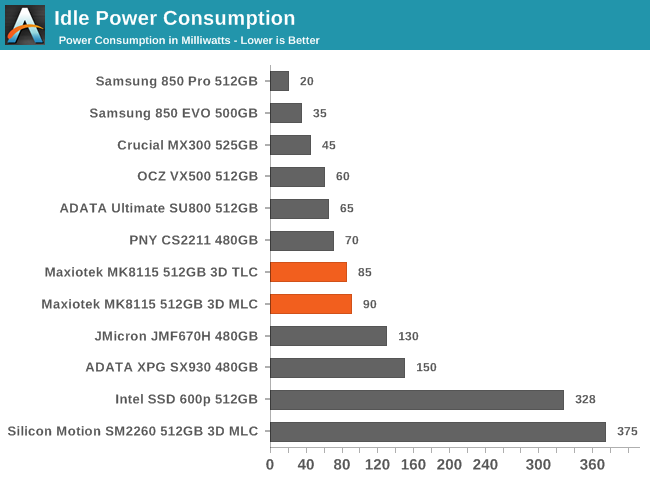
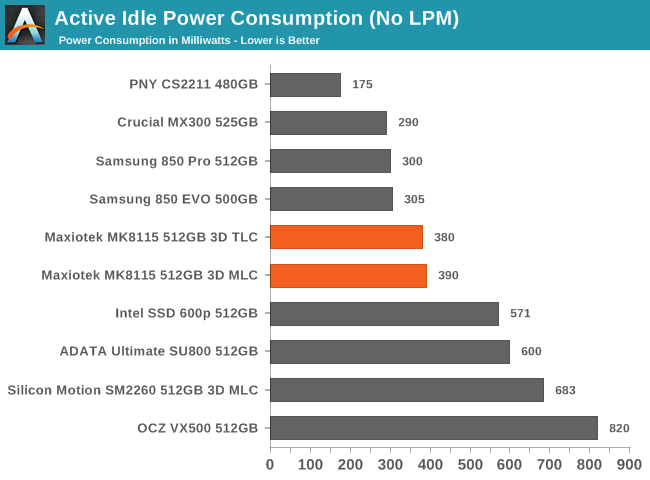
Idle power of the MK8115 is significantly improved over the JMF670H, but still lagging slightly behind the Phison-based PNY CS2211 and nowhere near the best SATA SSDs. Samsung and Marvell use more advanced lithography nodes for their controllers, and the smaller competitors on lagging fabrication processes can't beat them.
The active idle power consumption of the MK8115 drives is decent: it's clearly better than for the Silicon Motion drives or the OCZ VX500, but not quite as good as the Samsung and Marvell drives, nor the unusually efficient PNY CS2211.










60 Comments
View All Comments
MajGenRelativity - Tuesday, May 9, 2017 - link
That might be a long way awayvladx - Tuesday, May 9, 2017 - link
You're gonna have to wait till mid-2019 for that.CheapSushi - Wednesday, May 10, 2017 - link
You'll get that most likely when QLC drives come out. But consider they'll be for bulk storage rather than general use.MajGenRelativity - Thursday, May 11, 2017 - link
YepHomeworldFound - Tuesday, May 9, 2017 - link
There's definitely some kind of manipulation occurring in the memory industry, it's happening with both DRAM and NAND.FH123 - Tuesday, May 9, 2017 - link
Let's see. JMicron SSD drives stalled (I had one). Two different USB drive enclosures, featuring JMicron chipsets, caused random data corruption for me and my colleague. The DVD / Blueray drives on my desktop randomly fail to show after boot. The chip they're hanging off of? JMicron. Will I consciously buy anything from this company or their offshoots? Nope. Their chips are ubiquitous and hard to avoid, but what trash they are.romrunning - Tuesday, May 9, 2017 - link
Don't forget the infamous JMicron "stutter" problem!vladx - Tuesday, May 9, 2017 - link
I have an ADATA SP600NS34 with JMicron JMF670H and it's a solid drive with 100% life remaining after 3TB written. No slowdowns or drive timeouts either.jabber - Tuesday, May 9, 2017 - link
I'm trying to hold off buying in any SSD drives at the moment. Prices have got silly compared to what I was paying a year ago for essentially a better product.romrunning - Tuesday, May 9, 2017 - link
So true on the pricing woes - I'm hoping there is more MLC capacity coming on soon.